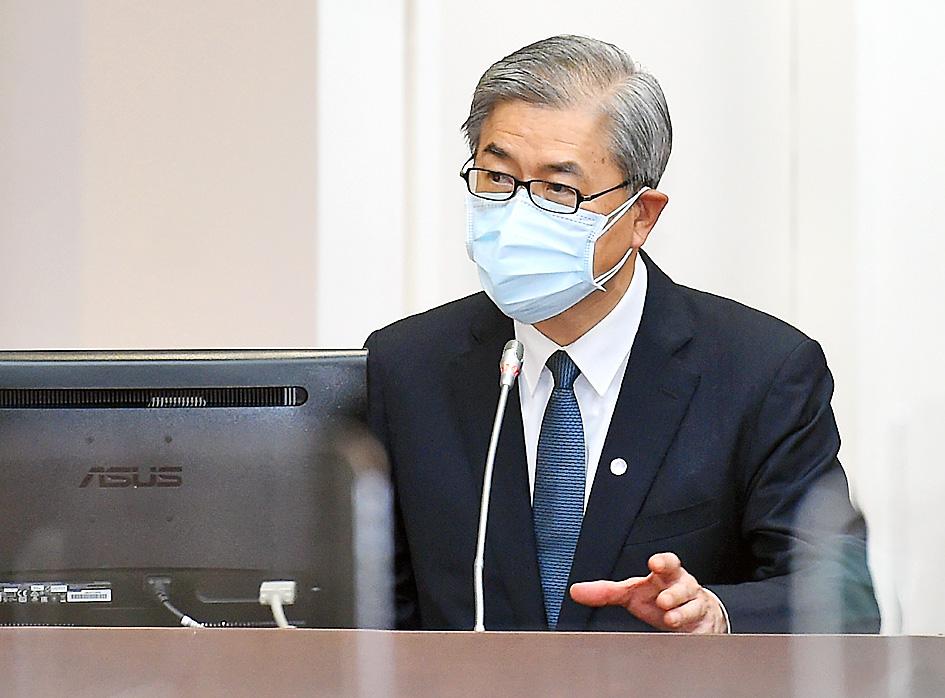The local insurance industry is expected to face more than NT$41 billion (US$1.38 billion) in COVID-19 claims amid a surge in domestically transmitted cases, Financial Supervisory Commission (FSC) Chairman Thomas Huang (黃天牧) said yesterday.
In a meeting of the legislature’s Finance Committee, Huang cited an internal assessment that forecast insurance claims would surpass a NT$41 billion estimate made by a legislator.
Chinese Nationalist Party (KMT) Legislator Lai Shyh-bao (賴士葆) said that non-life insurance companies had sold about 7.6 million COVID-19 policies that are to pay holders if they test positive for the disease or are placed in quarantine as close contacts of positive cases.

Photo: Chu Pei-hsiung, Taipei Times
Based on a 15 percent infection confirmation rate and an average policy value of NT$36,000, the insurance industry could face about NT$41 billion in claims, Lai said.
Huang said that with the number of local COVID-19 cases still rising, the amount of total claims could surpass that estimate, but added that he could not yet give an exact figure.
Worries about an increase in COVID-19 insurance claims have risen amid a surge in local cases, particularly in the local equity market as stocks of financial companies with large insurance assets have come under pressure due to expectations of heavy financial burdens, dealers said.
Democratic Progressive Party Legislator Chiang Yung-chang (江永昌) said that based on his estimates, if the COVID-19 confirmation rate rises to 20 percent among an anticipated 8 million insurance policies, total claims could reach NT$100 billion, putting more financial pressure on the local insurance industry.
Chiang said that the government should help non-life insurance firms manage the problem by providing financial relief with funds from the national insurance guaranty fund, but Huang dismissed the proposal.
He said that the commission would encourage insurance firms to raise their capital size by having shareholders contribute more toward financial restructuring.
The commission was not inclined to use public funds to solve the industry’s financial problems, he said, adding that he had faith the local non-life insurance industry would remain resilient as long as its shareholders participate in capital increases.
The insurance guaranty fund for non-life insurance firms is about NT$5 billion, the commission said.
Some non-life insurance firms, which have been caught off guard by an explosive increase in domestic COVID-19 cases, have cited the “double insurance” clause under the Insurance Act (保險法) as grounds for not paying those who bought more than one COVID-19 policy.
Under the act, double insurance refers to when a person “enters into multiple insurance contracts with multiple insurers covering the same insurable interest and the same insured event.”
Non-life insurance companies have said that engaging in double insurance leads to “moral hazard,” which is when a person or entity increases their exposure to risk, as they would not bear the full costs of the risk.
However, if the insurers approved the policies, they must pay the claims and are not allowed to revoke the policies using the double insurance clause, Huang said.

PERSISTENT RUMORS: Nvidia’s CEO said the firm is not in talks to sell AI chips to China, but he would welcome a change in US policy barring the activity Nvidia Corp CEO Jensen Huang (黃仁勳) said his company is not in discussions to sell its Blackwell artificial intelligence (AI) chips to Chinese firms, waving off speculation it is trying to engineer a return to the world’s largest semiconductor market. Huang, who arrived in Taiwan yesterday ahead of meetings with longtime partner Taiwan Semiconductor Manufacturing Co (TSMC, 台積電), took the opportunity to clarify recent comments about the US-China AI race. The Nvidia head caused a stir in an interview this week with the Financial Times, in which he was quoted as saying “China will win” the AI race. Huang yesterday said

Japanese technology giant Softbank Group Corp said Tuesday it has sold its stake in Nvidia Corp, raising US$5.8 billion to pour into other investments. It also reported its profit nearly tripled in the first half of this fiscal year from a year earlier. Tokyo-based Softbank said it sold the stake in Silicon Vally-based Nvidia last month, a move that reflects its shift in focus to OpenAI, owner of the artificial intelligence (AI) chatbot ChatGPT. Softbank reported its profit in the April-to-September period soared to about 2.5 trillion yen (about US$13 billion). Its sales for the six month period rose 7.7 percent year-on-year

Nissan Motor Co has agreed to sell its global headquarters in Yokohama for ¥97 billion (US$630 million) to a group sponsored by Taiwanese autoparts maker Minth Group (敏實集團), as the struggling automaker seeks to shore up its financial position. The acquisition is led by a special purchase company managed by KJR Management Ltd, a Japanese real-estate unit of private equity giant KKR & Co, people familiar with the matter said. KJR said it would act as asset manager together with Mizuho Real Estate Management Co. Nissan is undergoing a broad cost-cutting campaign by eliminating jobs and shuttering plants as it grapples

MORE WEIGHT: The national weighting was raised in one index while holding steady in two others, while several companies rose or fell in prominence MSCI Inc, a global index provider, has raised Taiwan’s weighting in one of its major indices and left the country’s weighting unchanged in two other indices after a regular index review. In a statement released on Thursday, MSCI said it has upgraded Taiwan’s weighting in the MSCI All-Country World Index by 0.02 percentage points to 2.25 percent, while maintaining the weighting in the MSCI Emerging Markets Index, the most closely watched by foreign institutional investors, at 20.46 percent. Additionally, the index provider has left Taiwan’s weighting in the MSCI All-Country Asia ex-Japan Index unchanged at 23.15 percent. The latest index adjustments are to